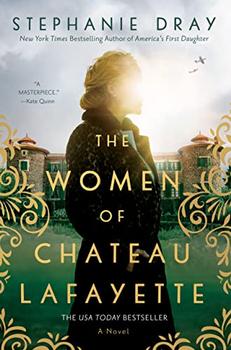Summary | Excerpt | Reading Guide | Reviews | Beyond the book | Read-Alikes | Genres & Themes | Author Bio

Our First Impressions reviewers enjoyed reading about Frances Perkins, Franklin Delano Roosevelt's Secretary of Labor, in Stephanie Dray's novel Becoming Madam Secretary; out of 33 reviewers, 32 gave the book four or five stars.
What it's about:
The prologue begins with a scene in FDR's office in 1933 where he is asking Frances Perkins to be his Secretary of Labor. For reasons we learn later, she has already decided she will not accept the appointment. She lays out what she would do if she had the position, assuming that her agenda is so radical that he won't agree to it. To her amazement, he does. How could she say no? Chapter One takes us back in time to the summer of 1909, when Frances is getting a master's degree in economics. Upon graduation, she begins a career of fighting for workers' rights. She observes the tragic Triangle Shirtwaist Factory fire, which makes her an unstoppable force for safety in the workplace. Her successes attract the attention of New York Governor Al Smith and Theodore Roosevelt, as well as FDR.
The author delves into Perkins' personal life, a happy marriage that gradually disintegrates due to her husband's mental illness, which seems to be genetically transmitted to their daughter as well. It was for this reason that she was reluctant to take the position offered by FDR. But she did, and brought about legislation that even today affects every citizen of the US. Without Frances Perkins, there is some doubt that we would have ever had Social Security, minimum wage, unemployment insurance, child labor laws, and so many other safety net programs (Jim T).
Readers loved learning more about Frances Perkins' work and were impressed with all she was able to accomplish at a very misogynist time in history.
But the real story here is how she had to endure hatred, lies, death threats, scorn in the press, and sabotage by other members of the Cabinet; yet she maintained her dignity, pressing forward to get the programs she knew were needed by the American people. This is a book about history, but more importantly an inspiring story about courage and persistence in the face of seemingly impassable barriers (Jim T). Her struggles to overcome the horrors of unfair, cruel, and unsafe work environments, poverty and her own personal struggles at home are a testament to her strength and character so very well portrayed in the book (Miss Liz).
In addition to her professional accomplishments, readers found Dray's depictions of Perkins' personal life compelling.
Her support of her husband and daughter during their struggles with mental illness and her deep friendships attest to her strength of character. The author, Stephanie Dray, did an excellent job bringing Frances Perkins to light in this book (Ellen H). Dray also portrays Perkins' struggles, so pertinent to many working women, to juggle her commitment to being a loving, available mother to her daughter throughout their lives with her commitment to her equally demanding and fulfilling work life (Dianne S).
Becoming Madam Secretary has what many see as the markers of a successful work of historical fiction.
The job of writing historical fiction about a larger-than-life character like Ms. Perkins and all the important people she had to push, cajole, and convince, requires not only extensive research but also the creativity to try to discern and write what plausibly could have been her thoughts and her conversations. Stephanie Dray does a masterful job of all of the above. As she says in her Author's Note, "Novelists can go where historians rightly fear to tread." (Jim T). What a great book! I'm embarrassed to say I knew nothing of Frances Perkins nor her incredible achievements. A fiction book that sends the reader searching for more information must be a great book and this is one of them. I continue to be astonished that a book about the woman deeply involved in FDR's New Deal and the architect of Social Security could be such a page-turner! (Jeanne W).
While some found the writing style to be less than desirable…
The book is often repetitive and provides overly exhaustive detail, especially regarding her relationships with Paul and Ramsey. I often found I skipped whole pages to avoid some details (Dianne S). At times her characters felt rather flat, and the tone seemed superficial. The novel was a bit long, but there was so much territory to cover. This was an easy read, interesting and informative (Ruthie A).
...others found it exceptional.
Her writing pace matches the intense drama and passion of Perkins and like-minded women who sought out justice and fair labor practices. Because of her ability to tell a good story while revealing significant facts about women in history, the reader comes away from each chapter breathless for the next one (Ricki A).
And many felt it would be a good choice for a book group discussion.
The influence of Frances Perkins continues to this day. Book groups will find much to discuss about Ms. Perkins' personal life, professional life, and the balance between them (Shawna L). Dray, true to her previous books, has woven an interesting dialogue covering some very important parts of the history of our nation. A book worth reading for your personal illumination as well as a book destined for book clubs and the many different directions the conversations can flow (Carole A). I have suggested to the members of my book club we read Becoming Madam Secretary and look forward to a great discussion with other thoughtful women on a subject that has benefited us in our own life endeavors (Ricki A).
![]() This review was originally published in The BookBrowse Review in April 2024, and has been updated for the
April 2025 edition.
Click here to go to this issue.
This review was originally published in The BookBrowse Review in April 2024, and has been updated for the
April 2025 edition.
Click here to go to this issue.

If you liked Becoming Madam Secretary, try these:

by Addison Armstrong
Published 2022
The Paris Library meets The Flight Girls in this captivating historical novel about the sacrifice and courage necessary to live a life of honor, inspired by the first female volunteer librarians during World War I and the first women accepted into the U.S. Naval Academy.

The Women of Chateau Lafayette
by Stephanie Dray
Published 2022
An epic saga from New York Times bestselling author Stephanie Dray based on the true story of an extraordinary castle in the heart of France and the remarkable women bound by its legacy.
Your guide toexceptional books
BookBrowse seeks out and recommends the best in contemporary fiction and nonfiction—books that not only engage and entertain but also deepen our understanding of ourselves and the world around us.